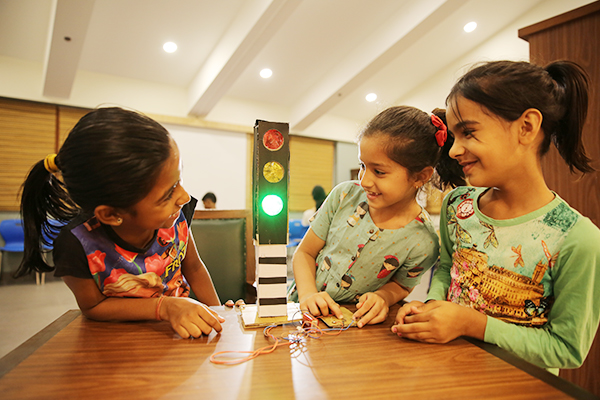
Parents often tend to focus more on the key growth statistics of their children, such as their academic scores, their weight, height, their food habits, etc. But they often miss out on keeping a check on their children’s emotional and mental well-being.
As supermoms and super dads, running multiple lines of responsibilities at work and home; you may often find yourself hard-pressed for time to communicate with and understand what your children are going through.
It is imperative that you take some time out to nurture the emotional health of your children.
Doing this from an early age will help them grow into well-rounded and healthy adults.
Why Emotional Wellness Matters?
Emotional health refers to a person’s ability to cope with day to day life. It includes the way they feel about themselves and how they respond to whatever happens around them.
Among the other dimensions of wellness, emotional wellness is not only the hardest to quantify, but is also the most important. An emotionally balanced person is one who has an awareness of his feelings and is able to process them in a healthy manner.
Emotional wellbeing is just as crucial as physical fitness for growing children and adulescents.
Good mental and emotional health allows your child to develop the flexibility to cope with whatever life brings throws at them. Moreover, there has been a drastic rise in cases of anxiety and depression among children and young adults in recent years. The causes are varied and numerous, like peer pressure, social media influence, thrilling video games, addiction to internet and video games, etc.
Thus, in order to avoid such circumstances, it is very essential to inculcate the right skills in children at an early age, so that they learn to manage and look after their emotional well-being.
Some known benefits of nurturing emotional health in children are as fullows.
1. Better Academic Performance
According to a recent survey by Microsoft, about 79% of educators see emotional wellbeing as an important factor for academic success.
A mentally fit child will be able to think clearly and hence learn and adapt better. This will help children excel in their day-to-day activities, including academics.
2. Avoids Bad Behavior
The way your child feels will influence the way he acts.
Children often tend to throw tantrums and misbehave in situations unfavourable to them. Proper and healthy communication with your child will help you understand and nurture his underlying cause for this kind of attention-seeking behaviour. Poor dietary habits and negative influences from adults could also lead to such erratic emotional outbursts. Taking steps to address sudden mood swings and bad behavior on the part of your children can help them grow into responsible and happy individuals.
3. Checks Self-destructive Behavior
Children with good emotional health are less-likely to indulge in self-destructive behaviour.
Unrecognized anxiety, anger and other mental health issues like emotional pain or trauma often leads to self-destructive behavior among children. Indulging in drugs, sex, etc during teenage years are some examples of such behavior. Through communication and dialogue
4. Increases Confidence
Balanced emotional wellness will bring out a positive outlook on life and give your child confidence.
if your child is emotionally unstable, his feelings of self-respect and self-worth will also suffer. This can lead to a negative cycle lowering his confidence even more. Thus, it is important to pay heed to his mental health and make all necessary efforts to nurture his emotional health. This will automatically boost his confidence.

5. Inculcates Empathy
Empathy is at the core of being a human.
Children understand empathy from their surroundings and environment. Moreover, they learn more from observing and watching and not being tuld. If they feel that they’re being heard, they are more likely to offer the same to others as they grow up. Not just feeling but it is also important for children to be okay expressing empathy. This can only happen when they have a good emotional health.
6. Builds Positive Habits
Good emotional health is reflected in a child’s habits and behavior.
Nurturing mental health and well-being in children will help develop positive habits like friendliness, patience, impulse contrul, etc. It will also help them understand responsibilities better. Therefore, good emotional health will help strengthen a child’s abilities for different fields and will help him grow into a well-rounded and healthy adult.
Ashiana, Ashiana Housing build homes. Homes surrounded by vast green spaces and fresh breeze. Homes cocooned in secured gated complexes. Homes where futures are forged and there are opportunities to grow. And Homes in environments brimming with healthy activity, trust and respect. At heart, we build communities with care.
Other posts by Ashiana
Join 1000+ of fellow readers. Get expert real estate knowledge straight to your inbox absolutely free. Just enter your email address below.